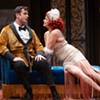Published September 28, 2005 at 9:37 p.m.
Getting stranded on a mysterious island after a violent storm: The tale is as old as Odysseus' bad boat ride back from the Trojan War, and as new as the travails of the polar bear-plagued Pacific castaways on ABC's award-winning series "Lost." What draws us to these stories is not so much the exotic locales or the mythical beasts but how the characters respond to the island's magic, which upends rules, roles or reality.
In The Tempest, William Shakespeare tosses a broad range of humanity onto his fantasy isle and explores the reactions of ignoble nobles, naïve lovers, drunken fools, a misshapen monster and a loyal sprite. Lost Nation Theater's ambitious and energetic production, skillfully directed by Kim Bent, features an outstanding cast and a sumptuous visual presentation.
It's tricky to sketch the story line concisely, because in this Shakespeare play, the plot is not the point. Like the playwright himself, the central character Prospero has the magical power to control the actions and destinies of everyone on his island. After all of the storytelling's twists and turns, the resolution centers on just one question: Will Prospero choose vengeance or forgiveness?
Before the play's action begins, Prospero's brother Anthonio has usurped the dukedom of Milan from him and cast him adrift on an unseaworthy vessel with his young daughter Miranda. They wash up on a remote island, where Prospero hones both his bitterness and his skill at magic. He enslaves the island's two other inhabitants -- a clever sprite, Ariel, and an odious savage, Caliban -- and lavishes his attention on educating his daughter.
The play opens with a shipwreck. Prospero's enemies, the Duke of Milan and the King of Naples, are returning from a wedding in Tunis. With Ariel's help, Prospero runs their ship aground on his island, splits their party into several groups so each will fear the others have drowned, and plays games with them as he decides their fate. A surprise love match develops between Miranda and the king's marooned son Ferdinand, and Prospero finds his heart softening and his old anger resolving in unexpected ways.
A production of The Tempest presents many challenges, and director Bent deserves a shipload of credit for marshaling his resources with such a deft touch. The play requires choreographing a large ensemble of actors engaged in a great deal of activity, yet the space never felt overcrowded, nor the action chaotic. Bent's casting was brilliant from stem to stern.
One of the greatest challenges with Shakespeare is rendering the 400-year-old language so that dialogue is easily intelligible to modern ears, the story advances smoothly, and the Elizabethan humor remains fresh -- without butchering the poetry. In this production, the two leads took different and successful approaches to this task, appropriate to their characters.
As Prospero, John D. Alexander spoke as if he'd been plucked off The Globe stage circa 1605. His rhythms were completely natural and comfortably lived in; his diction was precise without being artificially crisp. His clear, confident speech underpinned a commanding performance. Alexander took on Prospero's many mantles, from angry sorcerer to tender father, without chewing the scenery. If anything, he erred on the side of being slightly laconic at times, which was actually refreshing in a role that has the potential to overpower the play.
As Ariel, Anna Soloway let her limber body do a lot of the talking for her. She nimbly used gesture, expression, dance and even music to accentuate the text's meaning. Her coppery-costumed sprite underscored words with action, scampering about every corner of the set to make sure her story was told. Soloway played Ariel with a warm mix of vibrancy and vulnerability, and her singing reflected the same tender charm.
There were many strong supporting performances from the 18-member cast. The comic trio of Stephano, Trinculo and Caliban got many of the play's biggest and basest belly laughs.
David Poirier reveled in his role as Stephano, a ruddy-faced, rum-soaked sea dog who stumbled on stage lasciviously singing a "scurvy tune" to women in the front row of the audience. Evan Alboum played the dimwitted, high-strung jester Trinculo with a delicious nervous energy. As Caliban, the agile Diomedes Koufteros artfully writhed his way through his wretched character's brutalized existence: low to the ground, subjugated in body and mind, but flashing traces of fighting spirit with his eyes.
While the comic trio hatches alcohol-induced schemes, the sextet of stranded nobles is rent by power struggles. As the King of Naples, Mark Roberts portrayed the perplexed and perturbed monarch touchingly, alternating between dewy-eyed (he thinks his son has perished in the shipwreck) and doughty (he is still the king!). As the king's counselor, the loyal and longwinded Gonzalo, Tim Tavcar blended one part gasbag with one part gallantry. Gonzalo is oblivious to the fact that his tiresome soliloquies are driving others to unsheathe their swords: the King's brother Sebastian (Scott Renzoni), who oozes with sleaze and sarcasm; and Prospero's brother Anthonio (G. Richard Ames), the uneasy and ungainly usurper.
The sweetness of young lovers Miranda and Ferdinand provides a counterpoint to the boozy stupidity and smarmy scheming of the other castaways. Emily Lyons and John Russell played their parts with fresh-faced, wide-eyed innocence. Their relationship, which Prospero sorely tests, proves the key to helping him ultimately see that "The rarer action is in virtue, than in vengeance."
Claiborne H. Coyle's richly executed scenic and lighting design helped conjure the island's magical possibilities. Using a slightly surreal, late-Van Gogh palette of acid brightness, he mixed colors and textures from both land and sea. A looming, burlap-swathed tree dominated the set. Stylized woodgrain designs were painted, and fishing nets glued, on various levels of the stage. On the stage floor, two separate panels slid open to reveal a real pool of water, and a special-effects fire pit (which malfunctioned on opening night but was fixed by the next performance).
The abundance and richness of the costumes greatly added to the visual interest. The elaborate variations of fabrics and accessories delineated character status: Royals wore brocades and velvets, trimmed with fur and jewels. Sailors sported rough, homespun linen, while sprites and spirits wore suitably ethereal fabrics. Although some costumes were rented or borrowed, designer Milisa Brinton and her assistant Misha Macijeski created many of the most innovative outfits entirely from scratch, such as Ariel's shimmery copper confection and Caliban's grotesque assemblage.
Despite all The Tempest's strengths, it may feel somewhat awkward to attend a play built around a storm fantasy in a time of so much real-life storm tragedy. (Opening night was a benefit performance for hurricane relief, and Lost Nation will continue to collect money for the Red Cross during the show's run.) Shakespeare understood that tragedy stems from hubris and human failing -- which we have seen much of over the past few weeks. But for The Tempest, his final play, he chose an unlikely happy ending, a bold and reckless swerve toward optimism that should inspire us all. As even the usurping Anthonio understands, "What's past is prologue/What to come, in yours and my discharge."
More By This Author
Speaking of...
-

Executive Director Kurt Thoma Leaves Barre Opera House
Mar 5, 2024 -

Vermonter's Musical Bound for Broadway With Hillary Clinton as a Producer
Oct 25, 2023 -

Phantom Theater Finds New Winter Venue in Waitsfield
Oct 13, 2023 -

Double E 2023 Summer Concert Series Kicks Off With the Wailers
Mar 17, 2023 -

Off Center for the Dramatic Arts to Reopen in the New North End
Sep 23, 2022 - More »
Comments
Comments are closed.
From 2014-2020, Seven Days allowed readers to comment on all stories posted on our website. While we've appreciated the suggestions and insights, right now Seven Days is prioritizing our core mission — producing high-quality, responsible local journalism — over moderating online debates between readers.
To criticize, correct or praise our reporting, please send us a letter to the editor or send us a tip. We’ll check it out and report the results.
Online comments may return when we have better tech tools for managing them. Thanks for reading.













































